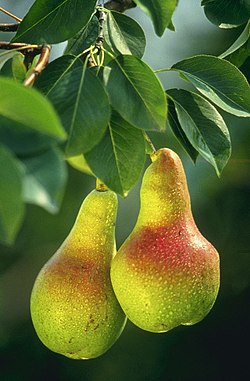pear
English

Etymology
From Middle English pere, from Old English pere, from Proto-West Germanic *peru, from Vulgar Latin *pira, originally the plural of Latin pirum but reconstrued as a feminine singular, ultimately a loanword from an unknown Mediterranean substrate source. Cognate with Saterland Frisian Peere (“pear”), Dutch peer (“pear”), Danish pære (“pear”), French poire (“pear”), German Birne (“pear”), Icelandic pera (“pear”), Swedish päron (“pear”).
Pronunciation
- (Received Pronunciation) IPA(key): /pɛə/
- (General American) enPR: pâr, IPA(key): /pɛɚ/
- (General Australian) IPA(key): /peː/
Audio (General Australian): (file)
- (New Zealand, without the cheer–chair merger) IPA(key): /ˈpeə/
- (New Zealand, cheer–chair merger) IPA(key): /ˈpiə/
- (Scotland) IPA(key): /ˈpeɹ/
- (India) IPA(key): /ˈpiːə(r)/
- (Lancashire, fair–fur merger) IPA(key): /ˈpɜː(ɹ)/
- Homophones: pair, pare, pere; peer, pier (both cheer–chair merger); per, purr (both fair–fur merger)
- Rhymes: -ɛə(ɹ)
Noun
pear (plural pears)
- An edible fruit produced by the pear tree, similar to an apple but typically elongated towards the stem.
- A type of fruit tree (Pyrus communis).
- Synonym: pear tree
- The wood of the pear tree (pearwood, pear wood).
- Choke pear (a torture device).
- (Jamaica) avocado, alligator pear
- A desaturated chartreuse yellow colour, like that of a pear.
- pear:
Hypernyms
Hyponyms
- anchovy pear (Grias cauliflora)
- apple pear (Pyrus pyrifolia)
- Asian pear (Pyrus pyrifolia)
- balsam pear (Momordica charantia, Citrullus lanatus)
- Bradford pear
- butter pear
- cactus pear (Opuntia spp.)
- Callery pear (Pyrus calleryana)
- Chinese pear (Pyrus pyrifolia)
- Chinese white pear (Pyrus × bretschneideri)
- choke pear
- common pear (Pyrus communis)
- European pear (Pyrus communis)
- garlic pear (Crateva spp.)
- grape pear (Amelanchier canadensis)
- hard pear (Olinia ventosa)
- Japanese pear (Pyrus pyrifolia)
- Korean pear (Pyrus pyrifolia)
- Le Conte pear
- Malvern pear
- Moorcroft pear
- nashi pear
- sand pear (Pyrus pyrifolia))
- snow pear (Pyrus nivalis)
- snowy pear
- Stinking Bishop pear
- strawberry pear (Stenocereus (syn. Hylocereus) spp.)
- sugar pear
- Taiwan pear, Taiwanese pear (Pyrus pyrifolia))
- vegetable pear (Sechium edule)
- vine pear
- wax pear
- willowleaf pear, willow-leafed pear (Pyrus salicifolia)
Derived terms
- alligator pear
- and a partridge in a pear tree
- apples and pears
- avocado pear
- butter pear
- Catherine pear
- choke pear
- desert pear
- go pear-shaped
- go pear shaped
- go pear-shaped, pear-shaped
- ground pear
- musk pear
- pear apple
- pear belle Hélène
- pear blight
- pear cider
- pear drop
- pear-encrinite
- pear gauge
- pear-gauge
- pear haw (Crataegus spp.)
- pear leaf blister mite (Eriophyes pyri)
- pear leaf blister moth (Leucoptera malifoliella)
- pear leaf-curling midge, pear leaf midge
- pearlike
- pear louse
- pear midge (Contarinia pyrivora)
- pearmonger
- pear of anguish
- pear orchard
- pear oyster scale (Pseudaulacaspis pentagona)
- pear plum
- pear psylla (Psylla pyri)
- pear quince
- pear shell
- pear slug (Caliroa cerasi)
- pear-sucker
- pear-thorn
- pear thrips (Taeniothrips inconsequens)
- peartini
- pear tomato
- pear tree, peartree, Pear Tree
- pear wine
- pear-wise
- pear-withe
- pear-wood
- peary
- perry
- Pope's pear
- prickly pear cactus
- prickly pear (Opuntia spp.)
- river pear
- sea pear
- tiger pear
- wooden pear
- woody pear
Descendants
Translations
|
|
|
See also
Anagrams
Galician


Alternative forms
Etymology
From Vulgar Latin *pilare, from Latin pīla (“pillar”).
Pronunciation
Noun
pear m (plural peares)
- pillar
- Synonym: columna
- window sill
- Synonym: peitoril
- one of several stone pillars placed by way of a bridge
- Synonym: poldra
Related terms
References
- Ernesto Xosé González Seoane, María Álvarez de la Granja, Ana Isabel Boullón Agrelo (2006–2022) “pear”, in Dicionario de Dicionarios do galego medieval (in Galician), Santiago de Compostela: Instituto da Lingua Galega
- Xavier Varela Barreiro, Xavier Gómez Guinovart (2006–2018) “piar”, in Corpus Xelmírez - Corpus lingüístico da Galicia medieval (in Galician), Santiago de Compostela: Instituto da Lingua Galega
- Antón Luís Santamarina Fernández, editor (2006–2013), “pear”, in Dicionario de Dicionarios da lingua galega (in Galician), Santiago de Compostela: Instituto da Lingua Galega
- Antón Luís Santamarina Fernández, Ernesto Xosé González Seoane, María Álvarez de la Granja, editors (2003–2018), “pear”, in Tesouro informatizado da lingua galega (in Galician), Santiago de Compostela: Instituto da Lingua Galega
- Rosario Álvarez Blanco, editor (2014–2024), “piar”, in Tesouro do léxico patrimonial galego e portugués (in Galician), Santiago de Compostela: Instituto da Lingua Galega, →ISSN
Jamaican Creole

Etymology
(This etymology is missing or incomplete. Please add to it, or discuss it at the Etymology scriptorium.)
Pronunciation
Noun
pear (plural pear dem, quantified pear)
- avocado
- Mi waan sum ackee an pear.
- I'd like a few akees and avocados.
See also
Further reading
- Richard Allsopp, editor (1996), Dictionary of Caribbean English Usage, Kingston, Jamaica: University of the West Indies Press, published 2003, →ISBN, page 434
West Frisian
Etymology
From Old Frisian pār, ultimately from Latin pār.
Noun
pear n (plural pearen, diminutive pearke)
Further reading
- “pear”, in Wurdboek fan de Fryske taal (in Dutch), 2011
